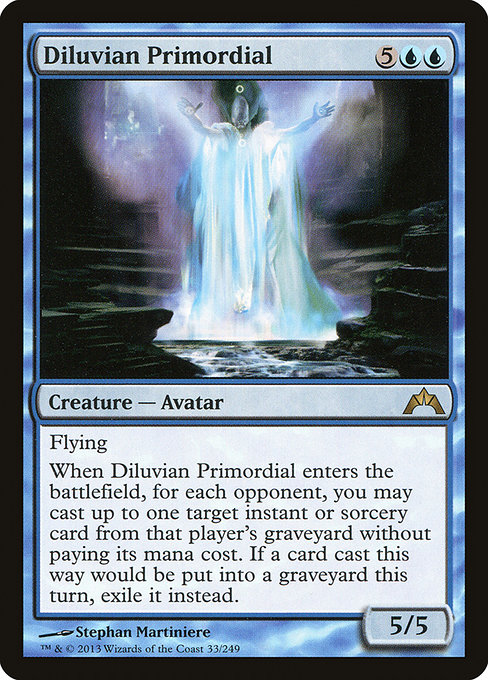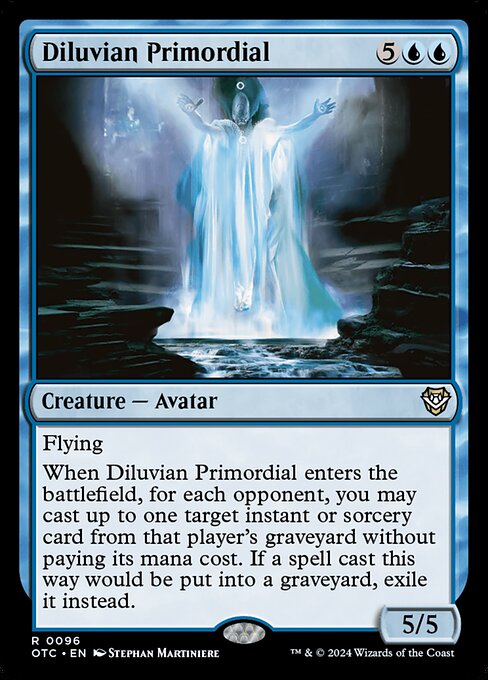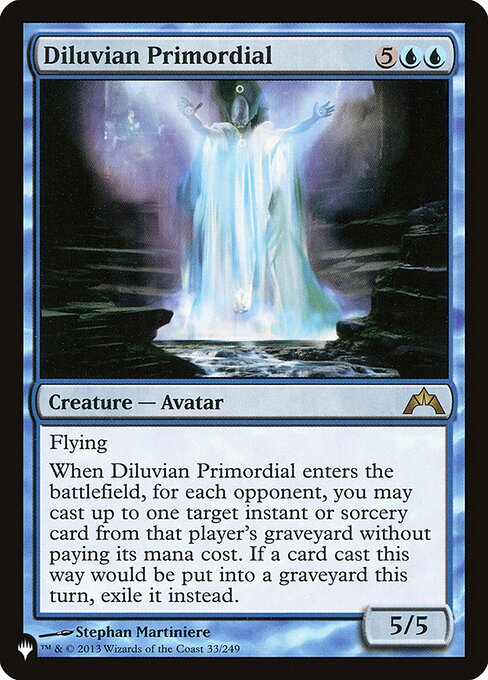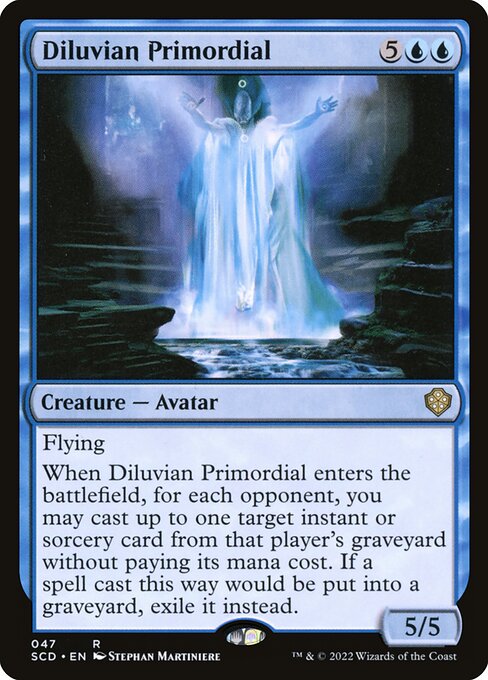Diluvian Primordial
Creature — Avatar
Flying
When Diluvian Primordial enters the battlefield, for each opponent, you may cast up to one target instant or sorcery card from that player's graveyard without paying its mana cost. If a spell cast this way would be put into a graveyard, exile it instead.
When Diluvian Primordial enters the battlefield, for each opponent, you may cast up to one target instant or sorcery card from that player's graveyard without paying its mana cost. If a spell cast this way would be put into a graveyard, exile it instead.
5/5
standard
future
historic
gladiator
pioneer
explorer
modern
legacy
pauper
vintage
penny
commander
brawl
alchemy
paupercommander
duel
oldschool
premodern
Rulings
If a card has in its mana cost, you must choose 0 as its value.
If an instant or sorcery card you cast this way is countered, it will still be exiled.
You cast the cards one at a time, choosing modes, targets and so on. The last card you cast will be the first one to resolve.
When casting an instant or sorcery card this way, ignore timing restrictions based on the card’s type. Other timing restrictions, such as “Cast [this card] only during combat,” must be followed.
If an instant or sorcery card you cast this way goes to a zone other than exile or a graveyard, perhaps because one of its abilities says to put it into its owner’s hand, it won’t be exiled. This is true even if the card would be put into a graveyard later that turn.
If you cast a card “without paying its mana cost,” you can’t pay alternative costs such as overload costs. You can pay additional costs such as kicker costs. If the card has mandatory additional costs, you must pay those.
If you can’t cast one of the target instant or sorcery cards, perhaps because there are no legal targets available, or if you choose not to cast one, it will remain in its owner’s graveyard.
You can choose a number of targets up to the number of opponents you have, one target per opponent.
If you cast an instant or sorcery spell with cipher this way, you may exile the card encoded on a creature you control. If you can’t, or if you choose not to, the card will end up exiled but not encoded on a creature.
If an instant or sorcery card you cast this way is countered, it will still be exiled.
You cast the cards one at a time, choosing modes, targets and so on. The last card you cast will be the first one to resolve.
When casting an instant or sorcery card this way, ignore timing restrictions based on the card’s type. Other timing restrictions, such as “Cast [this card] only during combat,” must be followed.
If an instant or sorcery card you cast this way goes to a zone other than exile or a graveyard, perhaps because one of its abilities says to put it into its owner’s hand, it won’t be exiled. This is true even if the card would be put into a graveyard later that turn.
If you cast a card “without paying its mana cost,” you can’t pay alternative costs such as overload costs. You can pay additional costs such as kicker costs. If the card has mandatory additional costs, you must pay those.
If you can’t cast one of the target instant or sorcery cards, perhaps because there are no legal targets available, or if you choose not to cast one, it will remain in its owner’s graveyard.
You can choose a number of targets up to the number of opponents you have, one target per opponent.
If you cast an instant or sorcery spell with cipher this way, you may exile the card encoded on a creature you control. If you can’t, or if you choose not to, the card will end up exiled but not encoded on a creature.
Rulings
If a card has in its mana cost, you must choose 0 as its value.
If an instant or sorcery card you cast this way is countered, it will still be exiled.
You cast the cards one at a time, choosing modes, targets and so on. The last card you cast will be the first one to resolve.
When casting an instant or sorcery card this way, ignore timing restrictions based on the card’s type. Other timing restrictions, such as “Cast [this card] only during combat,” must be followed.
If an instant or sorcery card you cast this way goes to a zone other than exile or a graveyard, perhaps because one of its abilities says to put it into its owner’s hand, it won’t be exiled. This is true even if the card would be put into a graveyard later that turn.
If you cast a card “without paying its mana cost,” you can’t pay alternative costs such as overload costs. You can pay additional costs such as kicker costs. If the card has mandatory additional costs, you must pay those.
If you can’t cast one of the target instant or sorcery cards, perhaps because there are no legal targets available, or if you choose not to cast one, it will remain in its owner’s graveyard.
You can choose a number of targets up to the number of opponents you have, one target per opponent.
If you cast an instant or sorcery spell with cipher this way, you may exile the card encoded on a creature you control. If you can’t, or if you choose not to, the card will end up exiled but not encoded on a creature.
If an instant or sorcery card you cast this way is countered, it will still be exiled.
You cast the cards one at a time, choosing modes, targets and so on. The last card you cast will be the first one to resolve.
When casting an instant or sorcery card this way, ignore timing restrictions based on the card’s type. Other timing restrictions, such as “Cast [this card] only during combat,” must be followed.
If an instant or sorcery card you cast this way goes to a zone other than exile or a graveyard, perhaps because one of its abilities says to put it into its owner’s hand, it won’t be exiled. This is true even if the card would be put into a graveyard later that turn.
If you cast a card “without paying its mana cost,” you can’t pay alternative costs such as overload costs. You can pay additional costs such as kicker costs. If the card has mandatory additional costs, you must pay those.
If you can’t cast one of the target instant or sorcery cards, perhaps because there are no legal targets available, or if you choose not to cast one, it will remain in its owner’s graveyard.
You can choose a number of targets up to the number of opponents you have, one target per opponent.
If you cast an instant or sorcery spell with cipher this way, you may exile the card encoded on a creature you control. If you can’t, or if you choose not to, the card will end up exiled but not encoded on a creature.
Your collection? Your decks?
Want to manage your collection and/or create decks?
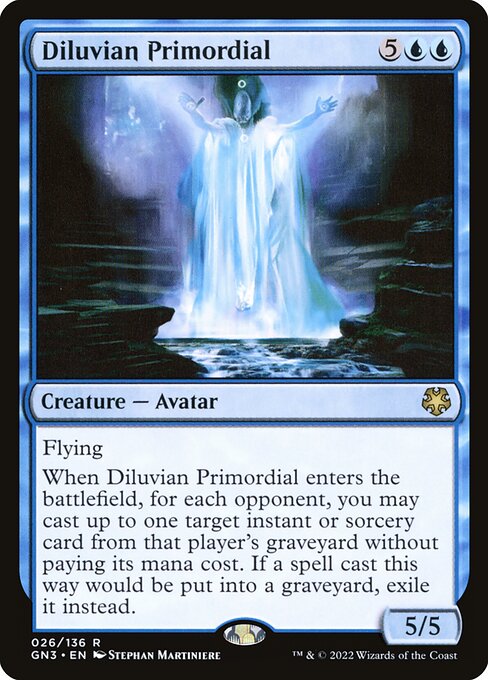

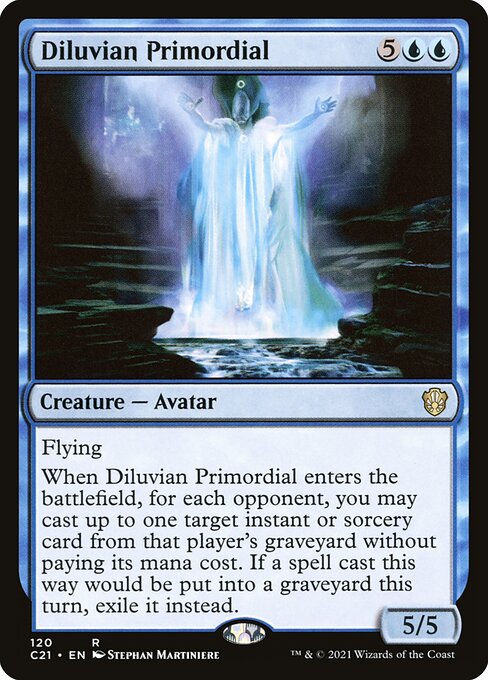
 0
0
 0.29€
0.29€
